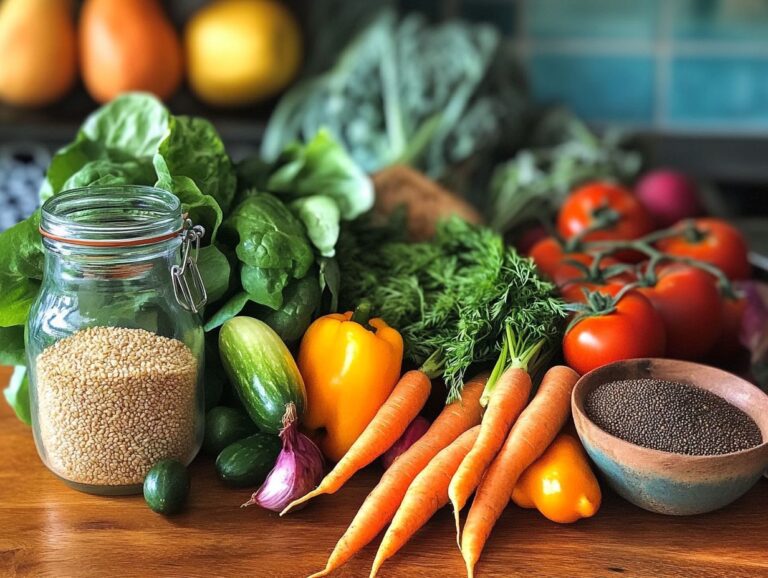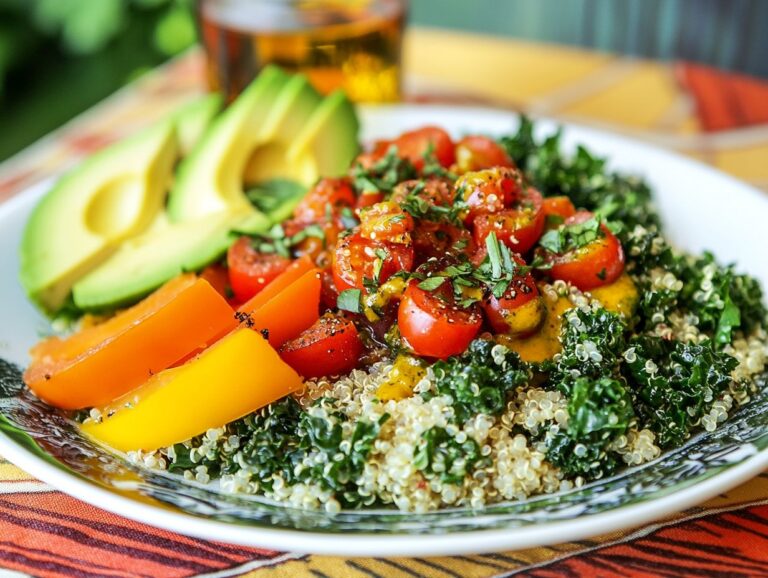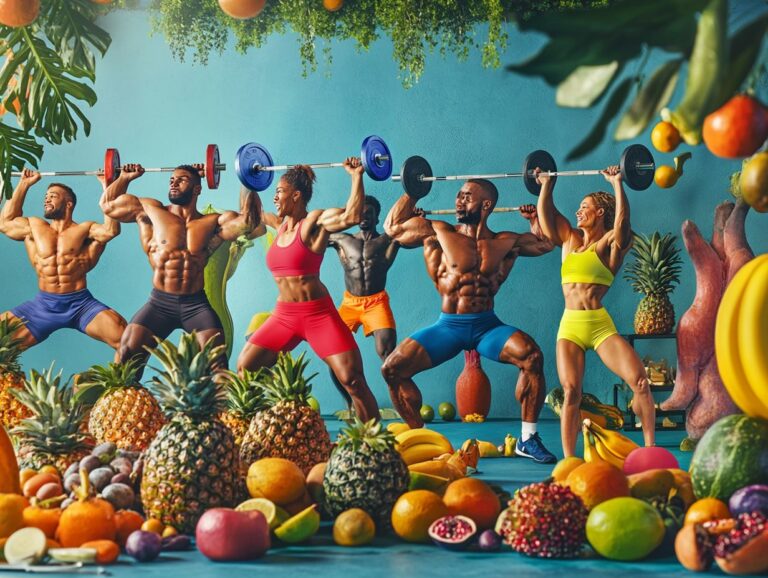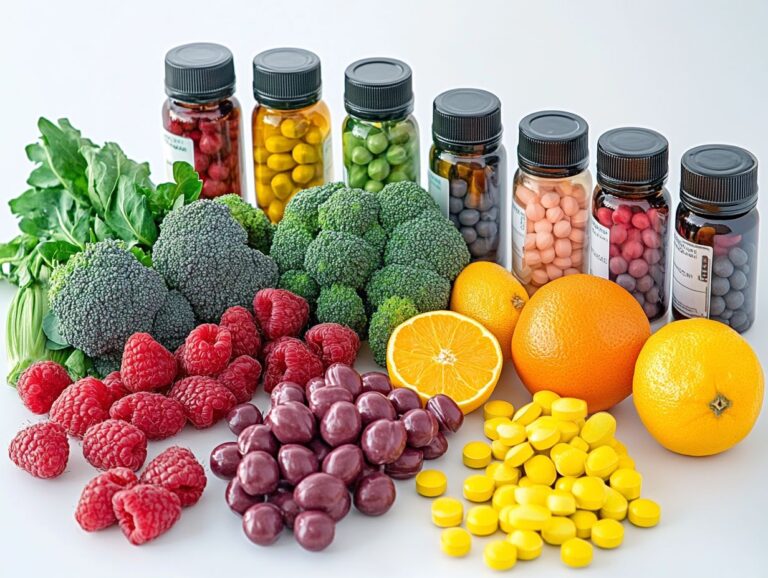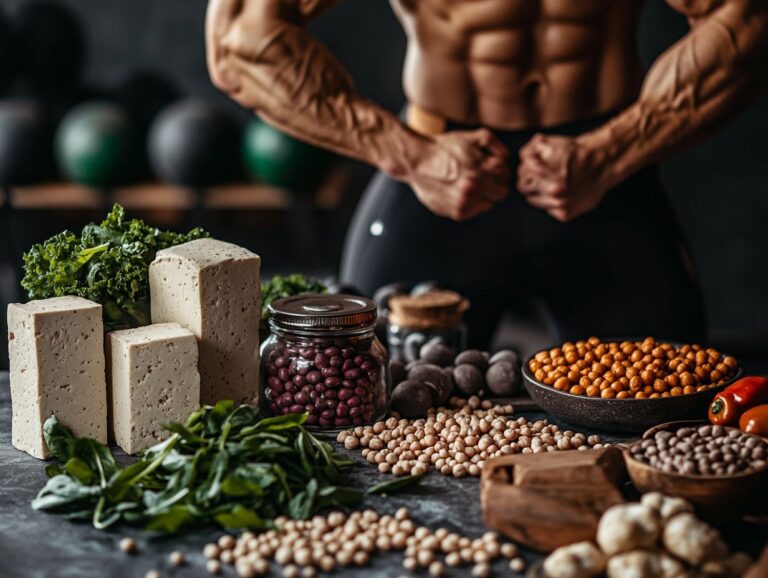Adopting a vegan diet can be a transformative lifestyle choice, but for some, it comes with unexpected challenges, particularly when it comes to gaining weight due to caloric density issues.
While many people associate plant-based eating with weight loss, there are plenty of reasons why some individuals struggle to add healthy pounds, including differences in body type and caloric deficit.
This article explores what defines a vegan diet, the key nutrients that may be lacking, such as protein-dense foods and healthy fats, and practical strategies to boost calorie intake.
Discover delicious high-calorie vegan foods and meal ideas, including nuts and seeds and energy-dense foods, that can help achieve a balanced approach to weight gain while staying true to dietary choices.
Key Takeaways:
- Increase calorie intake and include healthy fats to gain weight on a vegan diet.
- Choose nutrient-dense foods, such as quinoa and black beans, and eat frequently to support healthy weight gain.
- Incorporate strength training and consult with a registered dietitian to maintain a healthy weight on a vegan diet.
What Is a Vegan Diet?
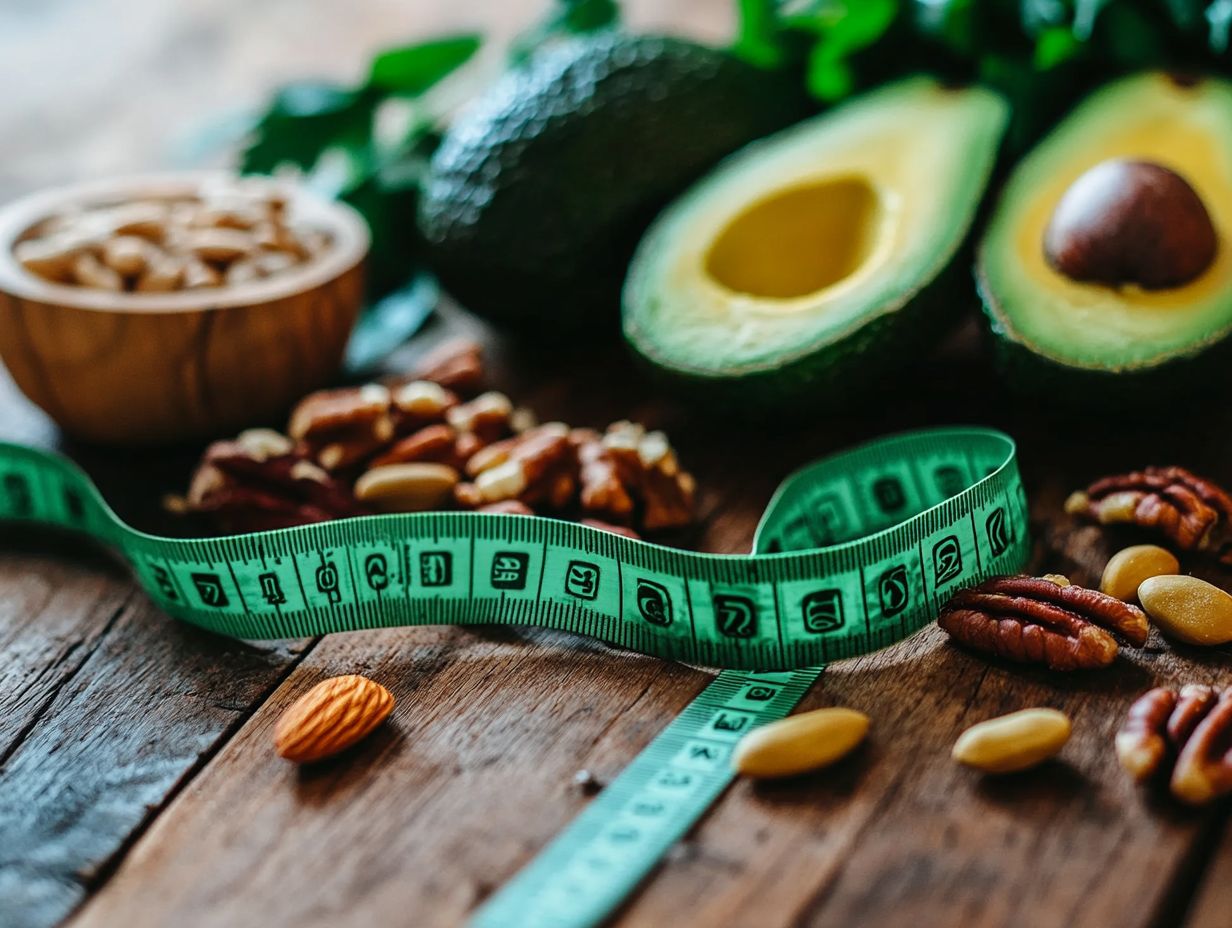
A vegan diet is a lifestyle choice that excludes all animal products and focuses exclusively on plant-based foods. This includes a wide variety of vegetables, fruits, grains, nuts, seeds, and legumes.
In alignment with the philosophy of veganism, this diet promotes the health benefits of consuming whole, unrefined plant foods while also emphasizing the ethical treatment of animals and environmental sustainability.
Additionally, veganism encourages dietary patterns that optimize nutritional intake and motivates individuals to explore diverse sources of essential nutrients within the plant food spectrum.
Why Do Some People Struggle to Gain Weight on a Vegan Diet?
Despite the numerous health benefits of a vegan diet, many individuals struggle to gain weight while following it. This difficulty often arises because many plant foods naturally have a low caloric density, which can lead to an unintentional caloric deficit.
Factors such as body type and metabolic differences significantly influence this issue, making it essential to monitor calorie intake carefully to ensure sufficient calories are consumed. By learning to incorporate higher-calorie foods strategically, individuals on a vegan diet can effectively address this common challenge associated with weight gain.
What Nutrients Are Lacking in a Vegan Diet?
A well-planned vegan diet can offer numerous health benefits; however, it may often lack certain essential nutrients required for a healthy body, such as protein, iron, vitamin B12, and omega-3 fatty acids.
To ensure adequate intake, vegans should focus on incorporating protein-rich foods like legumes, nuts, and seeds into their meals, potentially adding protein powder to boost intake, and they should also consider using appropriate supplements to address any nutritional deficiencies.
Having a good understanding of nutrition information is essential for maintaining a balanced diet and maximizing the health benefits associated with a vegan lifestyle.
How to Gain Weight on a Vegan Diet?
Gaining weight on a vegan diet requires careful planning and intentional choices to increase overall caloric intake while maintaining nutritional quality.
Effective methods for achieving this include:
- Incorporating calorically dense foods, such as soy products and Tempeh
- Using big plates for serving sizes to increase meal sizes
- Adhering to a structured meal plan that prioritizes foods rich in healthy fats, proteins, and caloric density
To successfully gain weight on a vegan diet, it is essential to focus on calorie intake and ensure a proper distribution of macronutrients.
1. Increase Calorie Intake
The most effective way to gain weight on a vegan diet is to increase calorie intake by incorporating high-calorie foods such as nuts, seeds, and avocados into meals and snacks.
This approach highlights the importance of balancing calorie consumption with an active metabolism, allowing individuals to take in more energy without feeling overly full.
To successfully boost calorie intake, one can prepare energy-dense meals using ingredients like coconut milk in smoothies or quinoa in salads, adding richness to everyday dishes.
Snack options such as trail mixes with dried fruits and peanut butter provide a simple and satisfying way to increase calorie consumption throughout the day.
Additionally, meals can be enhanced with healthy oils, such as olive or flaxseed oil, to improve flavor while significantly contributing to overall calorie intake, aiding in weight gain.
2. Incorporate Healthy Fats
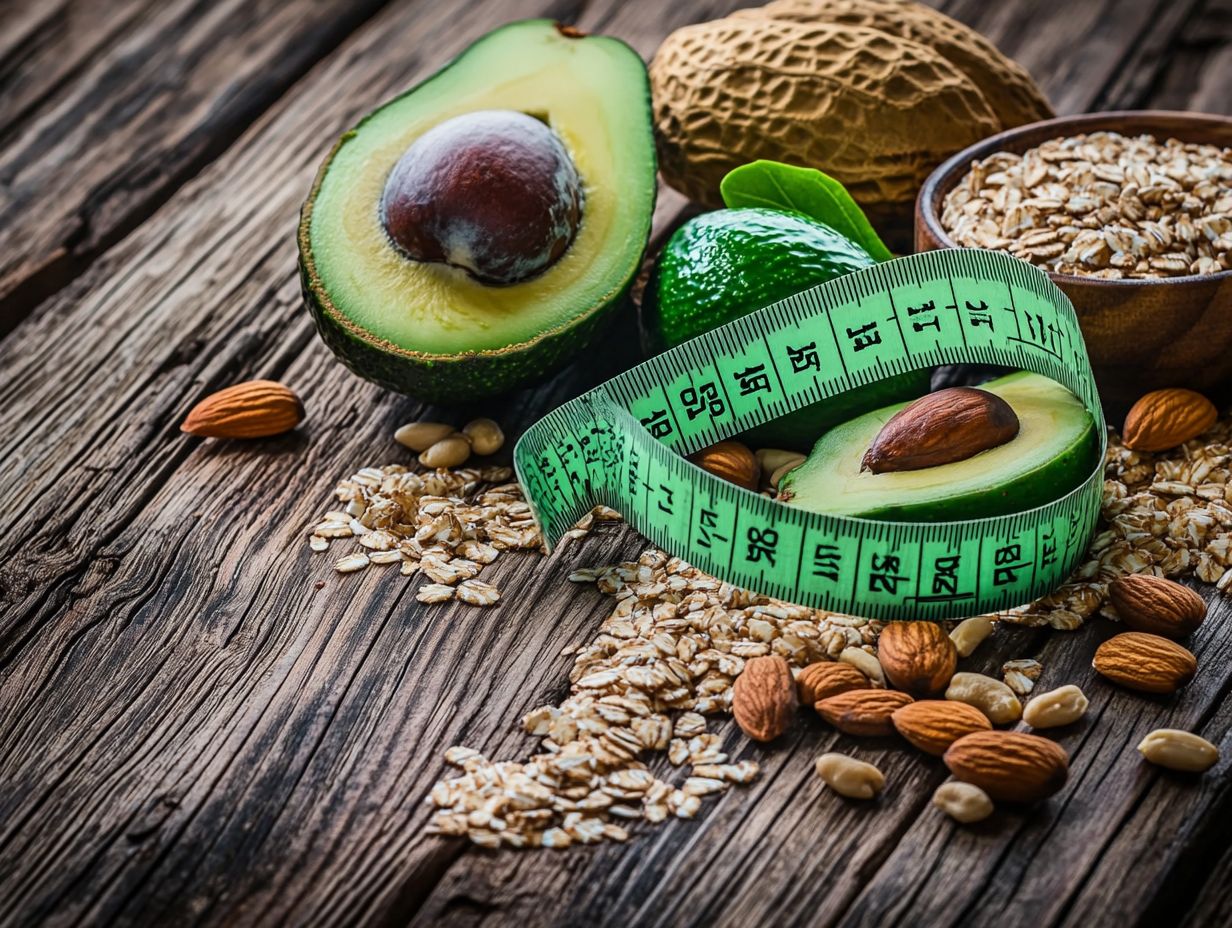
Healthy fats play a crucial role in a vegan diet that aims to promote weight gain, as they are calorie-dense and provide essential nutrients. Foods such as olive oil, coconut milk, and peanut butter not only enhance the flavor of dishes but also increase the overall caloric density of meals.
They are excellent choices for adding calories without significantly increasing portion sizes. Avocados and chia seeds also contribute importantly to a healthy vegan diet. Avocados offer a delicious source of healthy monounsaturated fats that support heart health and aid in nutrient absorption.
Chia seeds provide omega-3 fatty acids, which help reduce inflammation, and are high in fiber, supporting digestive health. These sources of healthy fats can easily be incorporated into smoothies, sprinkled over salads, or used in salad dressings.
For instance, drizzling olive oil over cooked vegetables can add calories without significantly increasing their volume.
3. Choose Nutrient-Dense Foods
Nutrient-dense foods are particularly important for vegans who aim to gain weight, as these foods provide essential vitamins, minerals, and macronutrients in a concentrated form. Examples of such nutrient-rich foods include legumes, quinoa, and soy products, all of which contribute to overall health and aid in building and repairing muscles—an essential aspect of any weight gain regimen.
Incorporating these foods into daily meals can help increase caloric intake without sacrificing nutritional quality. For instance, legumes like lentils and chickpeas can be added to salads or stews, while quinoa can serve as a base for grain bowls topped with fresh vegetables and healthy fats like avocados or nuts. Additionally, soy products such as tofu or tempeh can be included in stir-fries and curries, providing a robust source of protein that is beneficial for muscle maintenance and growth.
To effectively achieve weight gain goals, it is advisable to focus on whole foods and explore various recipes to ensure a balanced intake of different food groups.
4. Eat Frequently
Eating frequently throughout the day is an effective strategy for vegans to gain weight, as it allows for increased calorie consumption without the need for large meals. Following a structured meal plan that incorporates snacks and smaller meals at regular intervals makes it easier for individuals to track their caloric intake and meet their energy requirements.
This approach not only helps to reduce feelings of fullness but also prevents energy dips, allowing individuals to stay active and focused. Including a variety of nutrient-dense foods such as nuts, seeds, legumes, and whole grains can significantly enhance caloric intake while also providing essential vitamins and minerals.
To further improve meal frequency, it’s beneficial to plan ahead by selecting quick and portable snacks such as:
- Trail mix
- Avocado toast
- Protein bars
By preparing these options in advance, busy individuals are more likely to adhere to their meal plan and maintain a consistent calorie intake, effectively supporting their weight gain goals.
What Are Some High-Calorie Vegan Foods?
For vegan diets aimed at weight gain, high-calorie foods are essential as they offer concentrated sources of energy and other vital nutrients.
Examples of high-calorie vegan foods include:
- Various nuts and seeds
- Soy-based products such as tofu and tempeh
- Energy-dense options like avocados and coconut milk
Understanding which plant foods, such as Coconut milk and avocado, are high in calories can help individuals reach their dietary goals effectively.
1. Nuts and Nut Butters
Nuts and nut butters are some of the most calorie-dense foods available in a vegan diet, offering both healthy fats and protein-rich nutrients that support weight gain.
With options like almonds, walnuts, and peanut butter, these foods can easily be incorporated into meals and snacks to enhance overall caloric intake. These energy-packed options not only satisfy hunger but also deliver essential vitamins and minerals.
For example, walnuts are rich in omega-3 fatty acids, which are vital for heart health, while almonds are an excellent source of vitamin E, known for its antioxidant properties. Reference materials like The Game Changers also highlight the importance of nuts in vegan diets.
Incorporating these nutty delights into smoothies, oatmeal, or as a spread on whole-grain bread can significantly boost nutritional value. Exploring mixed nut butters can introduce a variety of flavors and textures into the diet, making it easier to enjoy the health benefits while maintaining a diverse and satisfying vegan meal plan.
2. Avocado
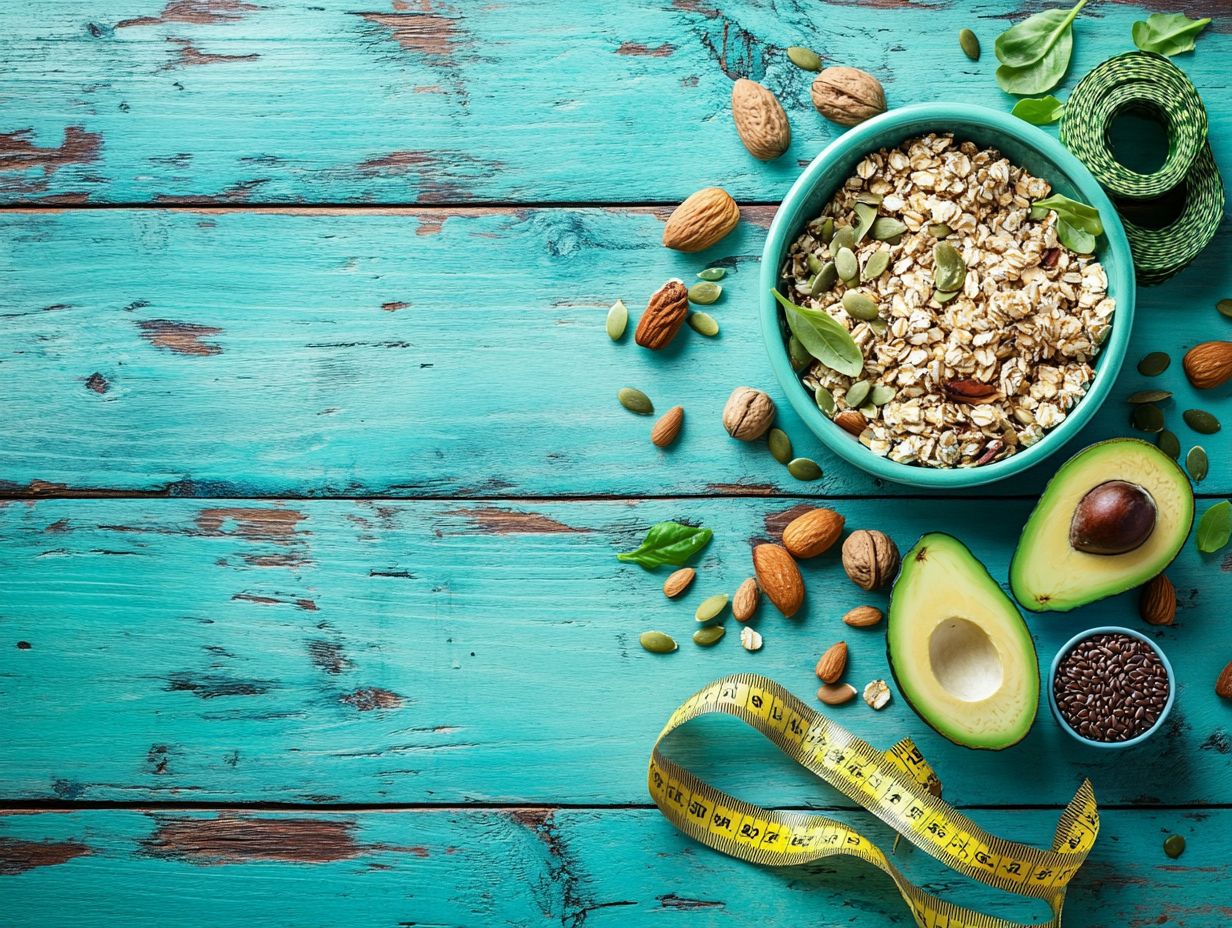
Avocado is a high-calorie food rich in healthy fats, making it a versatile addition to a vegan diet aimed at weight gain. Its creamy texture and numerous nutritional benefits, such as fiber and essential vitamins, allow for easy incorporation into a variety of dishes, from salads to smoothies.
Avocado can be effortlessly and deliciously included in daily meals. A mashed avocado spread on whole-grain bread with a sprinkle of salt and chili flakes offers a refreshing breakfast option. For a twist, try adding some brown rice for extra texture. As a base for salad dressing, it can be blended with citrus juices to create a creamy and refreshing flavor. When added to smoothies, avocado enhances the drink’s creaminess while providing beneficial fats.
Additionally, it serves as an excellent snack when paired with whole grain crackers or blended into guacamole. The versatility of avocado not only enhances the flavor of each dish but also contributes to a balanced intake of healthy fats and other essential nutrients, aligning well with the vegan philosophy.
3. Quinoa
With a protein content of 15%, quinoa is an excellent source of complex carbohydrates and ranks among the best food items for weight gain in a vegan diet. This grain contains all essential amino acids and is rich in nutrients, making it a staple in many vegan meal plans.
Quinoa is highly versatile and can easily be incorporated into meal planning, featuring in a variety of dishes, such as salads, bowls, and smoothies. Regularly adding quinoa to meals can help increase protein intake, but it is important not to do so at the expense of other protein-rich foods.
Quinoa provides nutrients that are often lacking in a vegan diet, including vitamin B, zinc, and magnesium. Its nutty flavor and unique texture make it a great complement to a wide range of ingredients, appealing to those who enjoy culinary experimentation and allowing for the creation of dishes with diverse consistencies and flavor profiles.
Quinoa can serve as a base for vegetable stir-fries, be mixed with beans and lentils for a hearty soup, or even be transformed into a breakfast porridge topped with nuts and fruits. Additionally, its short cooking time makes quinoa a convenient choice for those looking to reduce meal prep time. Consider using coconut milk for a creamy texture in breakfast porridge.
4. Tofu
Tofu, a popular soy product, is an excellent source of plant-based protein and can significantly contribute to a vegan diet aimed at weight gain. Its ability to absorb flavors and its availability in various forms, such as firm or silken, make tofu a versatile ingredient that can be included in a wide range of dishes for high-protein meals, including those inspired by The Game Changers documentary.
With its low calorie content and dense nutrient profile, tofu is an ideal choice for those seeking to increase their protein intake without significantly raising calorie consumption. This adaptable ingredient can easily fit into various culinary styles, from stir-fries to smoothies, ensuring that meals remain both exciting and nutritious.
Helpful tips for cooking with tofu include:
- Pressing it before cooking to remove excess moisture, which enhances flavor absorption.
- Marinating it before use to improve taste.
Adding tofu to salads, soups, or using it as a meat substitute can effectively boost the protein content of a meal, making it a vital ingredient for those looking to combine nutrition and flavor. Additionally, incorporating tempeh alongside tofu can offer a different texture and flavor profile.
What Are Some Healthy Vegan Meal Ideas for Weight Gain?
A healthy meal plan featuring vegan recipes is essential for individuals aiming to gain weight while following a plant-based diet.
High-calorie meal ideas include:
- A vegan protein smoothie made with protein powder, fruits, coconut milk, and healthy fats
- A quinoa and vegetable stir-fry with tempeh
Additionally, nutrient-rich dishes like lentil and vegetable curry and chickpea and avocado salad can be included to support weight gain goals. Calorie tracking can help ensure that these dishes meet the necessary dietary requirements.
1. Vegan Protein Smoothie
A vegan protein smoothie serves as a healthy source of calories and can be enjoyed as a quick meal or snack. By combining protein powder with fruits, coconut milk, and nut butter, it creates a high-calorie drink ideal for individuals looking to gain weight. This smoothie provides the protein necessary for muscle growth and recovery.
There are countless variations to suit different tastes and dietary needs. For instance, you can:
- Add spinach or kale for an extra boost of vitamins.
- Substitute coconut milk with almond or oat milk.
- Incorporate a variety of fruits such as bananas, berries, or mangoes for added flavor and fiber.
Additionally, chia or flaxseed can be included to enhance the smoothie’s calorie density.
2. Quinoa and Vegetable Stir-Fry
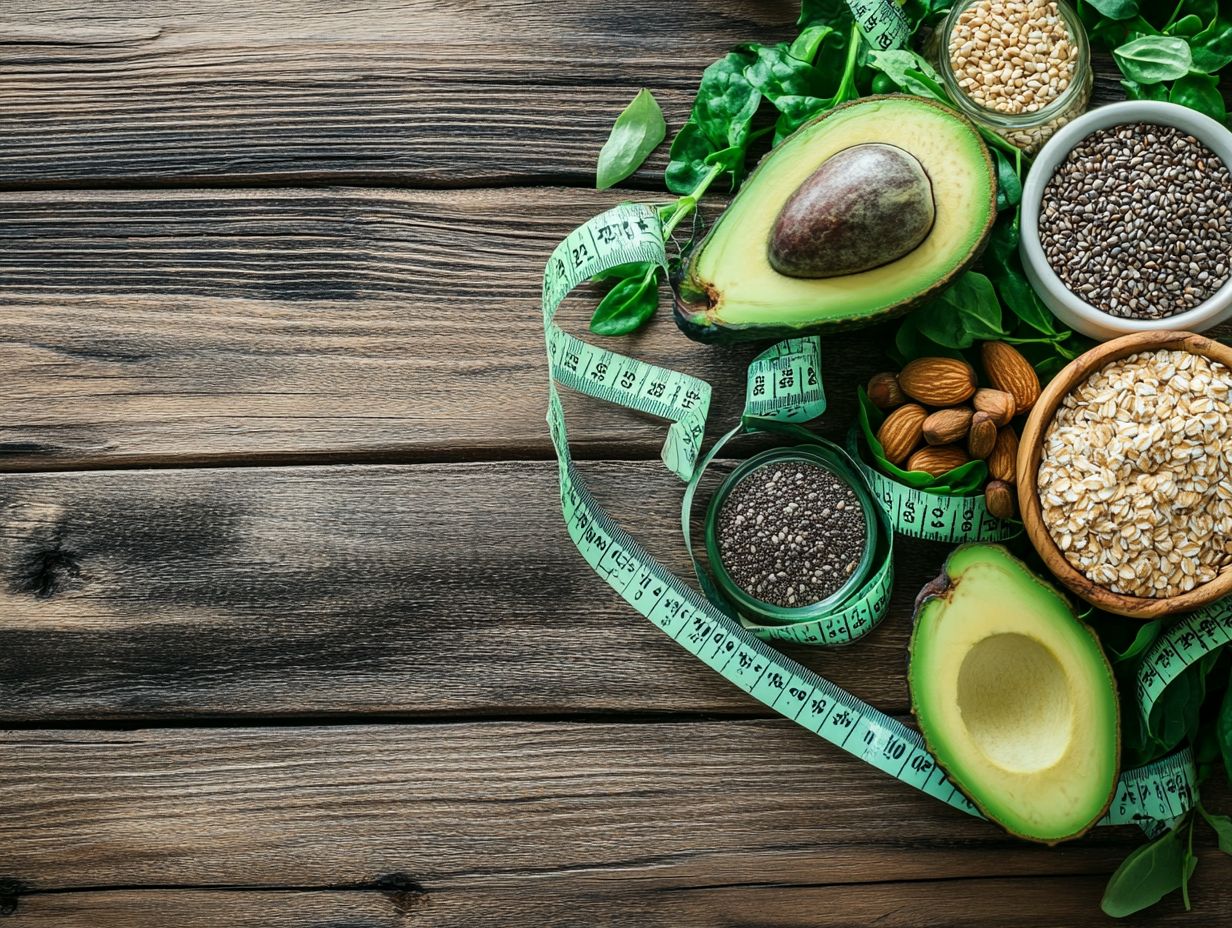
A quinoa and vegetable stir-fry is a healthy and hearty option for a plant-based diet, making it one of the best vegan foods for those looking to gain weight.
Stir-frying cooked quinoa with a variety of colorful vegetables results in a highly nutritious and protein-rich meal prep option. Opt for seasonal vegetables such as bell peppers, broccoli, and carrots to create a vibrant and nutritious stir-fry. Adding leafy greens like spinach and kale can further enhance the dish’s nutritional profile.
To elevate the flavor, consider incorporating garlic and ginger. Cook the quinoa according to package instructions until it is fluffy and tender. Sauté the vegetables in a splash of olive oil over high heat to maintain their crunch and bright colors. This quick cooking method helps preserve the vitamins and minerals in the ingredients, making this meal not only delicious but also packed with nutrients that promote overall health.
3. Lentil and Vegetable Curry
Lentil and vegetable curry is a hearty and abundant dish that offers a substantial amount of plant protein and other essential nutrients, making it ideal for those seeking to gain weight on a vegan diet.
Beyond its nutritional benefits, the cooking methods used to prepare this dish ensure that it achieves excellent flavor profiles, resulting in a delightful aroma and taste. The inclusion of lentils not only serves as a great source of protein but also helps maintain steady energy levels throughout the day.
Additionally, the incorporation of vegetables such as carrots, spinach, and bell peppers adds a variety of colors and textures, enhancing the dish’s appeal.
The slow simmering process allows the spices to meld beautifully, resulting in a rich and hearty curry that everyone will enjoy.
4. Chickpea and Avocado Salad
Chickpea and avocado salad is a refreshing, high-calorie recipe that combines the healthy fats of avocado with the protein-rich properties of chickpeas.
This salad can serve as a filling meal or a side dish, making it an ideal choice for those seeking nutritious and colorful high-calorie salad options.
This easy-to-make dish is prepared by tossing together rinsed chickpeas, diced avocados, and a variety of vibrant vegetables such as cherry tomatoes and cucumbers for added flavor and crunch.
Olive oil and lemon juice provide extra healthy fats and zest. Each serving offers numerous health benefits, including support for heart health and improved satiety, making this salad a delicious and satisfying choice at any time of day.
What Are Some Tips for Maintaining a Healthy Weight on a Vegan Diet?
Maintaining a healthy weight on a vegan diet is achievable by adopting a balanced approach that involves consuming nutrient-dense whole foods, engaging in regular physical activity, and seeking professional support when necessary.
By incorporating a diverse range of whole ingredients and, if needed, consulting a registered dietitian, individuals can ensure that their dietary choices align with their weight management goals.
1. Focus on Whole Foods
The key principles for maintaining a healthy weight on a vegan diet include prioritizing whole foods, which are nutrient-rich options that provide essential vitamins and minerals while minimizing processed foods. It is also important to incorporate a variety of vegetables and fruits, along with grains like brown rice, to ensure balanced nutrition.
Incorporating a variety of fruits, vegetables, whole grains, nuts, and seeds ensures a balanced intake of nutrients vital for the body’s overall functioning. Whole foods such as quinoa, lentils, and kale not only supply essential nutrients but also have a higher satiety quotient, helping to curb hunger and reduce cravings.
Consuming dark leafy greens that are high in iron and calcium, in conjunction with antioxidant-rich berries, can enhance immunity. Additionally, healthy fats from avocados and walnuts contribute to improved heart health and provide energy.
2. Incorporate Strength Training
Strength training is essential for promoting muscle gain and overall fitness in individuals following a vegan diet. It plays a crucial role in developing lean muscle mass and boosting metabolism, which enables individuals to better manage their weight and caloric intake.
Additionally, strength training increases bone density and enhances overall functional strength, both of which are vital for daily activities and injury prevention.
Vegans can benefit from various exercises, including resistance training, bodyweight exercises, and yoga, all of which contribute to improved muscle endurance and flexibility.
As they embark on their fitness journey, it is important for them to follow a balanced diet that includes good sources of protein, such as legumes, tofu, and tempeh, to support their muscle-building goals. Resources like active.com and the National Academy of Sports Medicine can offer guidance and tips for effective strength training.
Starting with lighter weights and gradually increasing the load can also provide a sustainable and enjoyable approach to building strength.
3. Listen to Your Body
Listening to your body and being attuned to your hunger cues is essential for healthy vegan weight loss, as it helps you make informed decisions about when and what to eat.
Developing body awareness enables you to maintain a more balanced diet by ensuring you receive adequate nourishment without overeating or undereating. Another advantage of body awareness is that it fosters a healthy relationship with food. Consulting with experts like Gena Hemshaw can provide valuable insights into mindful eating practices.
When you understand your body’s needs, you can avoid relying on strict schedules or external tools like calorie trackers to decide when to eat. This awareness allows you to differentiate between physical hunger and psychological cravings, a concept emphasized in the documentary The Game Changers.
Simple practices, such as keeping a food journal or being mindful during meals, can enhance your body awareness. Additionally, consuming a variety of nutrient-rich foods, including whole grains, legumes, tempeh, fruits, and vegetables, can further support a balanced diet by satisfying your physical hunger and helping to stabilize your energy levels throughout the day.
4. Consult with a Registered Dietitian
Consulting with a registered dietitian can be an effective strategy for individuals following a vegan diet, as it helps ensure that their nutritional needs are met through well-planned meals.
Dietitians possess the expertise to provide personalized recommendations to help individuals achieve their weight gain goals while navigating the complexities of plant-based nutrition. With guidance aligned with the standards of the National Academy of Sports Medicine, they can create tailored meal plans that emphasize nutrient-dense foods and address specific dietary concerns, such as protein, vitamin B12, and iron, which are essential in a vegan diet.
Additionally, dietitians can assist in identifying suitable substitutes such as coconut milk and recommend cooking techniques that enhance flavor while preserving nutrients.
Access to evidence-based guidance, such as that provided by nutrition experts like Gena Hemshaw, can help clarify the confusion often associated with vegan nutrition, making the transition smoother and more enjoyable. With the support of a dietitian, individuals can embark on a fulfilling dietary journey that aligns with their health goals and promotes overall well-being.
